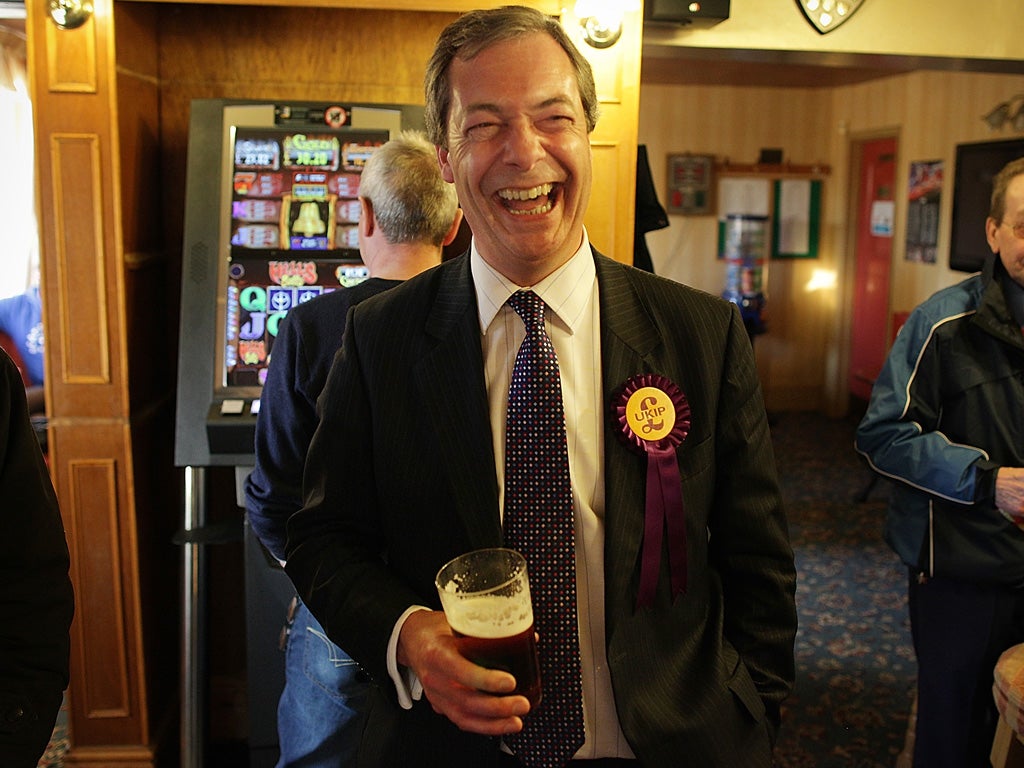Should Britain stay in or leave the EU? The ‘baffling’ prospect of an in-out vote
Nigel Farage has a point when it comes to the absurdity of the EU

Your support helps us to tell the story
From reproductive rights to climate change to Big Tech, The Independent is on the ground when the story is developing. Whether it's investigating the financials of Elon Musk's pro-Trump PAC or producing our latest documentary, 'The A Word', which shines a light on the American women fighting for reproductive rights, we know how important it is to parse out the facts from the messaging.
At such a critical moment in US history, we need reporters on the ground. Your donation allows us to keep sending journalists to speak to both sides of the story.
The Independent is trusted by Americans across the entire political spectrum. And unlike many other quality news outlets, we choose not to lock Americans out of our reporting and analysis with paywalls. We believe quality journalism should be available to everyone, paid for by those who can afford it.
Your support makes all the difference.Nigel Farage may be marching steadfast into the political battleground, defending Britain against the invasion of anti-democratic and migratory forces of the EU, determined to avoid repeat of the epidemic of Norman Yoke inflicted in 1066. His case against a politically united Europe may appear stronger than ever with its flagship currency in meltdown. His eloquence may at present be unmatched. Yet one cannot evade a feeling that this wave of UKIP furore will have drifted back towards the debating margins come the end of this parliament, just like the next wave of migrants from Romania and Bulgaria will drift into society without the visible public uproar Mr Farage relishes.
But this hunch is not derived from believing that liberal stereotyping of right-wing nationalists – what Peter Hitchins calls liberal bigotry - will resume its hegemonic grapple on public sentiment. UKIP and Farage are not closet racists. In fact, the imperfections of EU democracy, one of their biggest gripes regarding Europe, rings a blatant and somewhat disturbing truth. Imperfections put it lightly. To label the political union as a body adhering fundamental democratic values is an outright absurdity. The elected chamber of the European Parliament is devoid of the right to draft legislation, and the unelected European Central Bank, now (perhaps ominously) headquartered in Frankfurt, is wielding increasing fiscal power across heavily dependent member-states. UKIP then, calls for a return to the ideal of nation-state democracy.
That this will be delivered through a straightforward in-out referendum in 2017 is – to express it with Farage’s customary exasperation – "baffling". Cameron, in pledging this proposition, has reduced a debate of incomprehensible complexity to an implausibly simplistic pitch between anti- and pro-Europe. Public debate is aware of this. The recent BBC Question Time broadcast from Weymouth aired a response suggesting that the public have been perceived as incapable of deciphering beyond a yes or no scenario.
Farage and UKIP (and other supposed euro-sceptics) know that if and when the time arrives for a reasoned, knowledge-based debate that they will have to convince the masses on the grounds of economic rationality. And it is they that will have to succeed in this, for an exit from the EU appears as a striking and radical change compared to the prospect of riding out the storm sheltered inside. It is in and amongst the specifics of the coming discussion that the current Farage wave will fade. It would be a mistake to suggest that most will turn a blind eye to the details of this debate. The arrow struck Harold in 1066, and the UKIP vision of a British divorce from political Europe will be similarly blinded come 2017.
The writer is a final-year undergraduate studying History and Politics at the University of Warwick
Join our commenting forum
Join thought-provoking conversations, follow other Independent readers and see their replies
Comments